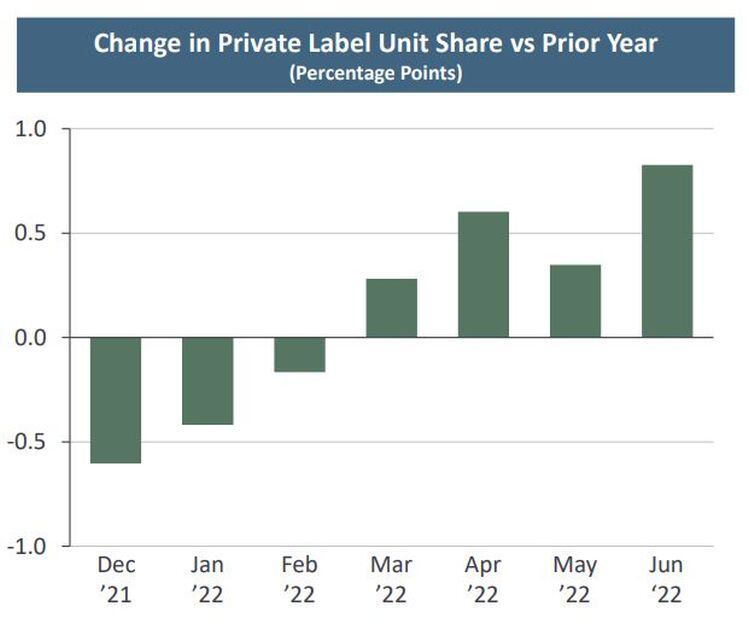“Technically we are in a recession when you look at just the basic definition of two quarters of GDP contraction,” and while consumer spending might not yet fully reflect this shift, they are starting to tighten their purse strings, Nik Modi, managing director at RBC Capital Markets told attendees last week during a webinar hosted by IRI.
“We do believe it is going to get a lot worse,” he said, pointing to shifts in how the government, retailers and manufacturers are managing inflation and ongoing fallout from the pandemic.
“The consumers have really been shielded by the inflation that we’ve seen, going back to late last year” when the government issued stimulus checks, paused student loan payments and expanded advance payments for child tax credits – all of which have ended or will soon, he said.
“This is a lot of money that was going into consumer pockets” or being redirected to other expenses, including food, clothing, rent and mortgage or other necessities, like school supplies, he explained.
At the same time, he said, retailers and manufacturers that thought inflation would be short lived or that they could absorb higher costs by managing other aspects of the business now realize they can’t offset all of it and are now pushing through belated price increases.
A ‘severe cliff in consumption’ looms
As these shifts take effect, consumers who have held steady in spending will start to pull back by trading down or out completely.
“As consumers, we really don’t want to compromise our lifestyles until we have to. And, I think, we’re approaching that point right now. My fear .. is that no one is really expecting what I think is going to be a severe cliff in consumption, which I do think is going to happen over the next several weeks and month going into the holiday season,” Modi said.
“Corporations are going to be blindsided by what is happening and as a result, I am concerned that they will kneejerk react and start layoffs, which will then catalyze a much more severe situation,” he said.
This is already happening to some extent with companies including Walmart, GoPuff, 7-Eleven and more announcing layoffs.
Consumers also are equally unprepared with personal savings rates as low as they’ve been since pre-pandemic, so there is very little cushion to help carry them – and the businesses they typically support – through the recession, Modi said.
How will this recession stack up to previous ones?
With this in mind, Modi said, this recession “is going to feel very different than what we saw in 2001 and 2008,” but some of the lessons learned from those declines could help companies navigate the current situation.
He explained that the previous recessions were “shock-oriented” – coming from fast-developing crisis that led to a deep trough. But this one has been slow building and will likely be shallower, but also last longer.
“It is going to create some growth-malaise,” as the US enters “an environment where consumers are really strapped because of inflation and because of potential rising unemployment,” he explained. “I am not sure we’re going to see the stimulus come into the market like we’ve seen in the prior downturns because, as we all know, that is part of the reason we have this inflationary problem … so it is a chicken and egg.”
Lessons from Coca-Cola, Birds Eye, Monster and other winners of the last recession
Still, he said, CPG manufacturers can learn from brands that performed well, including Coca-Cola, during the last recession.
While Coca-Cola plays in a segment that tends to be much more “defensible” than other staples, it still saw “remarkable” growth during the last recession with year-over-year organic sales growth of 4% and a 3% uptick in volume in 2009, said Modi.
He explained part of this came from the beverage giant using the 2008-2009 crisis to double down on its 2020 Vision and invest in digital, consumer insights, and personalization so that when consumers were ready to spend again after the recession, the company would be ready to meet them.
This is the same play that the company recently used during the pandemic when it decided to reorganize during a period that was already distracting so that it could hit the ground running when the world started to reopen and consumers could attend events and enjoy Coca-Cola products together again.
Another common theme between Coca-Cola’s response during the last recession and what it is doing now is its focus on absolute price points, packaging, elevating the value of the brand to justify purchases – all decisions that benefited retail partners and consumers as well as the brand.
Birds Eye and Monster Energy also saw notable growth during the last recession with compound annual growth rates of 16.1% and 18.6% from 2007 to 2011 respectively, KK Davey, president of strategic analytics at IRI, added during the webinar.
He explained that Birds Eye grew in part by targeting baby boomers with ads promoting Steamfresh products as part of recipes for complete meals and by expanding its offerings to include more convenient options, such as steamed vegetable sides, and microwavable meals with grains, pasta and protein. Monster won by launching new lines focused on unique needs, including a hybrid coffee and iced tea for morning occasions and different sizes for different users.
These cases illustrate how brands can attract new users and expand usage occasions during economic downturns by investing in emotional marketing, offering multi-serve and multi-function products, providing solutions that save time and money, offering small indulgences and addressing health, wellness and nutrition concerns.


